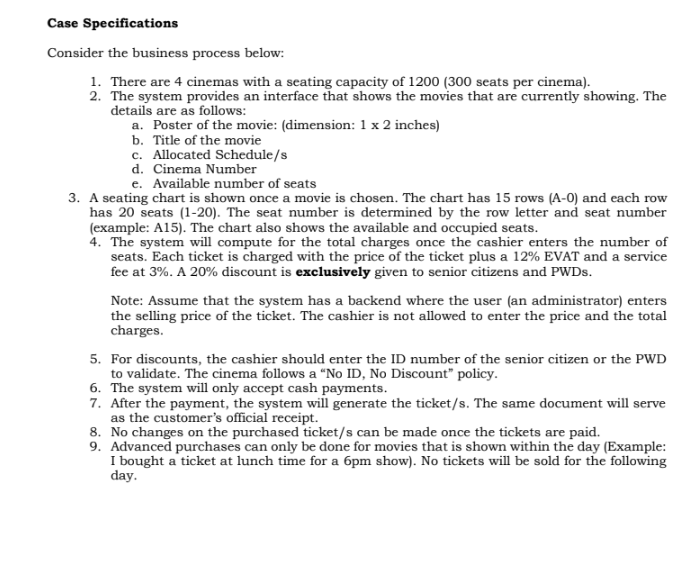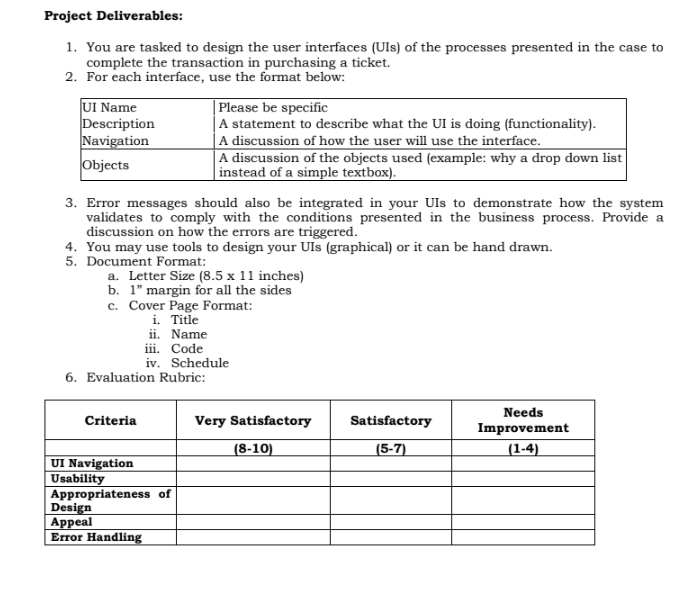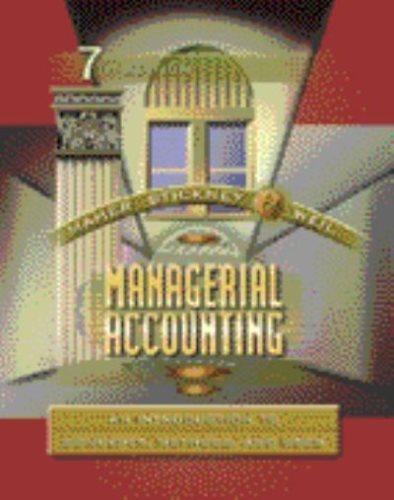

Case Specifications Consider the business process below: 1. There are 4 cinemas with a seating capacity of 1200 (300 seats per cinema). 2. The system provides an interface that shows the movies that are currently showing. The details are as follows: a. Poster of the movie: (dimension: 1 x 2 inches) b. Title of the movie c. Allocated Schedule/s d. Cinema Number e. Available number of seats 3. A seating chart is shown once a movie is chosen. The chart has 15 rows (A-0) and each row has 20 seats (1-20). The seat number is determined by the row letter and seat number (example: A15). The chart also shows the available and occupied seats. 4. The system will compute for the total charges once the cashier enters the number of seats. Each ticket is charged with the price of the ticket plus a 12% EVAT and a service fee at 3%. A 20% discount is exclusively given to senior citizens and PWDs. Note: Assume that the system has a backend where the user (an administrator) enters the selling price of the ticket. The cashier is not allowed to enter the price and the total charges. 5. For discounts, the cashier should enter the ID number of the senior citizen or the PWD to validate. The cinema follows a No ID, No Discount" policy. 6. The system will only accept cash payments. 7. After the payment, the system will generate the ticket/s. The same document will serve as the customer's official receipt. 8. No changes on the purchased ticket/s can be made once the tickets are paid. 9. Advanced purchases can only be done for movies that is shown within the day (Example: I bought a ticket at lunch time for a 6pm show). No tickets will be sold for the following day. Project Deliverables: 1. You are tasked to design the user interfaces (UIS) of the processes presented in the case to complete the transaction in purchasing a ticket. 2. For each interface, use the format below: UI Name Please be specific Description | A statement to describe what the UI is doing (functionality). Navigation A discussion of how the user will use the interface. Objects A discussion of the objects used (example: why a drop down list instead of a simple textbox). 3. Error messages should also be integrated in your UIs to demonstrate how the system validates to comply with the conditions presented in the business process. Provide a discussion on how the errors are triggered. 4. You may use tools to design your UIs (graphical) or it can be hand drawn. 5. Document Format: a. Letter Size (8.5 x 11 inches) b. 1" margin for all the sides c. Cover Page Format: i. Title ii. Name iii. Code iv. Schedule 6. Evaluation Rubric: Criteria Satisfactory Very Satisfactory (8-10) Needs Improvement (1-4) (5-7) UI Navigation Usability Appropriateness of Design Appeal Error Handling Case Specifications Consider the business process below: 1. There are 4 cinemas with a seating capacity of 1200 (300 seats per cinema). 2. The system provides an interface that shows the movies that are currently showing. The details are as follows: a. Poster of the movie: (dimension: 1 x 2 inches) b. Title of the movie c. Allocated Schedule/s d. Cinema Number e. Available number of seats 3. A seating chart is shown once a movie is chosen. The chart has 15 rows (A-0) and each row has 20 seats (1-20). The seat number is determined by the row letter and seat number (example: A15). The chart also shows the available and occupied seats. 4. The system will compute for the total charges once the cashier enters the number of seats. Each ticket is charged with the price of the ticket plus a 12% EVAT and a service fee at 3%. A 20% discount is exclusively given to senior citizens and PWDs. Note: Assume that the system has a backend where the user (an administrator) enters the selling price of the ticket. The cashier is not allowed to enter the price and the total charges. 5. For discounts, the cashier should enter the ID number of the senior citizen or the PWD to validate. The cinema follows a No ID, No Discount" policy. 6. The system will only accept cash payments. 7. After the payment, the system will generate the ticket/s. The same document will serve as the customer's official receipt. 8. No changes on the purchased ticket/s can be made once the tickets are paid. 9. Advanced purchases can only be done for movies that is shown within the day (Example: I bought a ticket at lunch time for a 6pm show). No tickets will be sold for the following day. Project Deliverables: 1. You are tasked to design the user interfaces (UIS) of the processes presented in the case to complete the transaction in purchasing a ticket. 2. For each interface, use the format below: UI Name Please be specific Description | A statement to describe what the UI is doing (functionality). Navigation A discussion of how the user will use the interface. Objects A discussion of the objects used (example: why a drop down list instead of a simple textbox). 3. Error messages should also be integrated in your UIs to demonstrate how the system validates to comply with the conditions presented in the business process. Provide a discussion on how the errors are triggered. 4. You may use tools to design your UIs (graphical) or it can be hand drawn. 5. Document Format: a. Letter Size (8.5 x 11 inches) b. 1" margin for all the sides c. Cover Page Format: i. Title ii. Name iii. Code iv. Schedule 6. Evaluation Rubric: Criteria Satisfactory Very Satisfactory (8-10) Needs Improvement (1-4) (5-7) UI Navigation Usability Appropriateness of Design Appeal Error Handling








